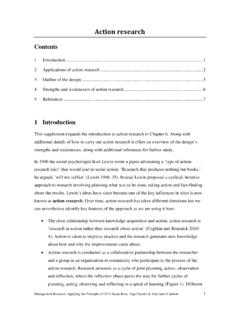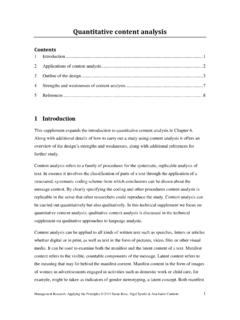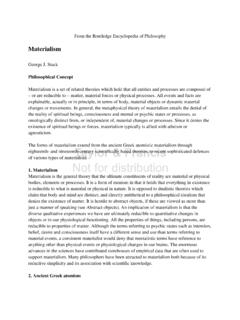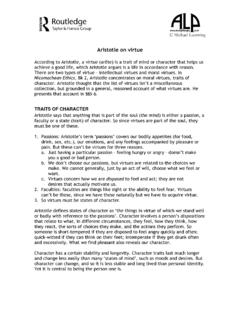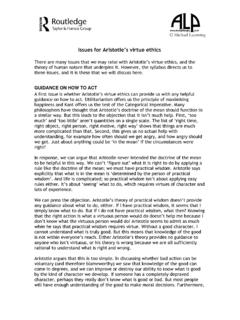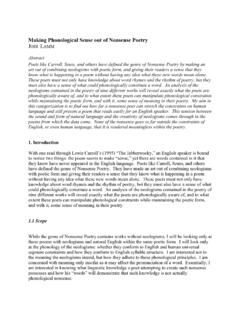Transcription of Metaphysics as speculative nonsense - Amazon Web Services
1 Michael Lacewing Metaphysics as speculative nonsense Metaphysics is the branch of philosophy that enquires about the fundamental nature of reality. This is not a very exact definition, but it exactly what counts as Metaphysics is not clear. The following traditional debates discussed in the A level syllabus are all metaphysical: 1. Universals 2. The world independent of all experience: what is the world like considered independent of any sense experience we have? (Plato s theory of forms and Kant s ideas on conceptual schemes) 3. The soul: what is the soul? do we have a soul? can it survive death? 4. First cause : what caused everything that exists?
2 How did it all begin? (The cosmological argument) 5. God: does God exist? If so, what is God s nature? 6. Metaphysical aspects of ethics: do ethical values exist objectively? To suggest, therefore, that Metaphysics is speculative nonsense will have an impact on much the philosophy that we do. Hume ends his An Enquiry concerning Human Understanding (p. 211) by saying, of any book let us ask, Does it contain any abstract reasoning concerning quantity or number? No. Does it contain any experimental reasoning concerning matter of fact and existence? No. Commit it then to the flames: For it can contain nothing but sophistry and illusion. The point is important: can we have any knowledge of answers to metaphysical questions?
3 We can argue yes either because we think that answers can be established on the basis of experience; or because we reject Hume s view, and want to defend the possibility of synthetic a priori knowledge. The debate whether Metaphysics is completely speculative is, in part, the debate between rationalism and empiricism. VERIFICATION In the 1930s, a school of philosophy arose called logical positivism, concerned with the foundations and possibility of knowledge. It developed a criterion for meaningful statements, called the principle of verification, that enabled it to reject as nonsense many traditional philosophical debates. On A J Ayer s version (Language, Truth and Logic), the principle of verification states that a statement only has meaning if it is either analytic or empirically verifiable.
4 An analytic statement is true (or false) just in virtue of the meanings of the words. For instance, a bachelor is an unmarried man is analytically true, while a square has three sides is analytically false. A statement is empirically verifiable if empirical evidence would go towards establishing that the statement is true or false. For example, if I say the moon is made of green cheese , we can check this by scientific investigation. If I say the universe has 600 trillion planets , we can t check this by scientific investigation in practice, but we can do so in principle. We know how to show whether it is true or false, so it is verifiable even though we can t actually verify it.
5 Why think these are the only two possibilities for meaning? Given that everyone accepts that empirical hypotheses are meaningful, the debate is, then, over a priori statements. Ayer seeks to show that all a priori truths are in fact analytic. And this argument is completed by showing that the purported statements of Metaphysics , if not analytic, are literally meaningless. Philosophy, then, doesn t give us knowledge of a reality that transcends the investigations of science. It is not a source of speculative truth. The function of philosophy is, instead, to bring to light the presuppositions of science and our everyday claims; in particular, to show what criteria are used to determine the truth of these claims.
6 Refining the proposal Some logical positivists originally wanted to say that verification must be conclusive, that a statement must be possible to prove true or false. However, this is far too strong, as Ayer argues; empirical hypotheses are only ever more or less probable, never completely certain. So he weakened the claim to verification requires that empirical evidence can raise or reduce the probability that a statement is true. Because empirical meaning depends on empirical verification, all statements about what is unobservable, therefore, must be translatable into statements that can be observed and verified in order to be meaningful. This applies as much in science as anywhere. Claims about electrons, for instance, are translatable into what is observable in laboratory conditions.
7 This, Ayer goes on to argue, must in fact be an analytic truth, statements about electrons mean statements about what is observable in the laboratory, if they are to mean anything at all. Statements about the past provide an interesting case. They are, now, impossible to prove; should they be taken to mean that there is something we can now experience that is relevant to their truth? This would be odd, since the core of the claim is that something was the case, not that it is now. So Ayer argues that claims about the past are claims that certain observations would have been possible or occurred under certain conditions. GETTING RID OF Metaphysics The verification principle entails that many debates in Metaphysics become impossible, while others are resolved in favour of a form of empiricism.
8 A world beyond sense experience Many philosophical theories defend the idea of a reality beyond what we experience through the senses. Plato s theory of the Forms is an example, but so are religious beliefs about the soul and an afterlife. No scientific experiment can establish the existence of the Forms or of a soul that survives death. Claims that they exist can t be translated into claims about anything we can actually observe. Because these claims are also not analytic, they are, in fact, meaningless. Yet the idea of a transcendent world can be found in Augustine, Aquinas, Descartes, Spinoza, Leibniz, Kant, Hegel, and Schopenhauer. Religion God exists , and so all other talk of God, also falls foul of the verification principle, claims Ayer.
9 Despite the best attempts of the ontological argument, we cannot prove God exists from a priori premises using deduction alone. So God exists is not analytically true. Therefore, to be meaningful, God exists must be empirically verifiable. Ayer argues it is not. If a statement is an empirical hypothesis, it predicts our experience will be different depending on whether it is true or false. But God exists makes no such predictions. So it is meaningless. Ethics The idea that objective ethical values exist or that there can be ethical truths is also ruled out as meaningless. If I say murder is wrong , this is not analytic, nor can any empirical investigation show this. We can show that murder causes grief and pain, or that it is often done out of anger.
10 But we cannot demonstrate, in the same way, that it is wrong. Ayer argued that ethical judgements express feelings: If I say to someone, You acted wrongly in stealing that money ..I am simply evincing my moral disapproval of it. It is as if I had said, You stole that money, in a peculiar tone of horror . (Language, Truth and Logic, p. 142] Moral judgements express our feelings of approval or disapproval. Feelings are not cognitions of value, and value does not exist independently of our feelings. NIETZSCHE ON Metaphysics Nietzsche provides an argument against Metaphysics very different from verificationism. He argues that metaphysical claims are, in the end, products of people s values.)
